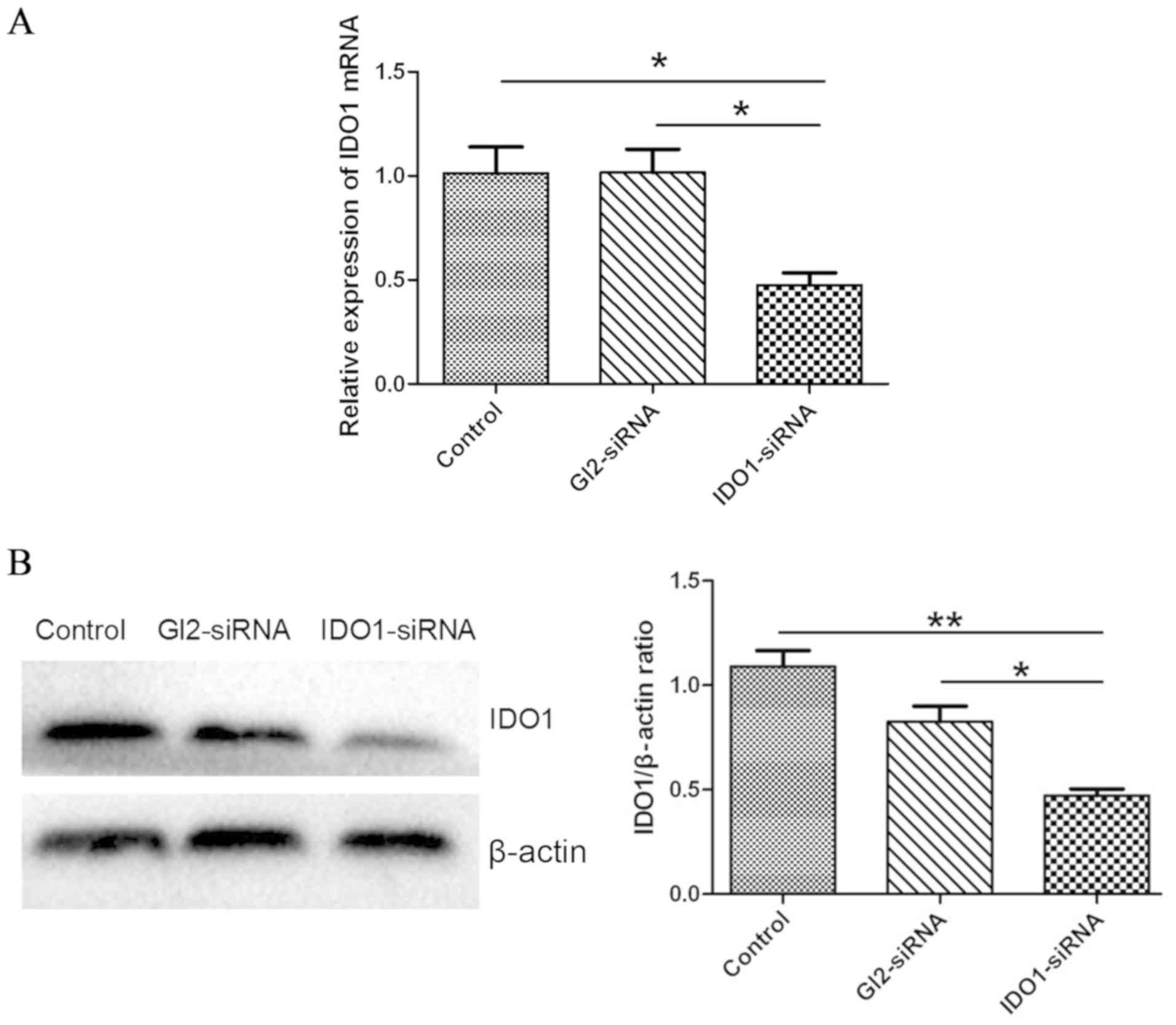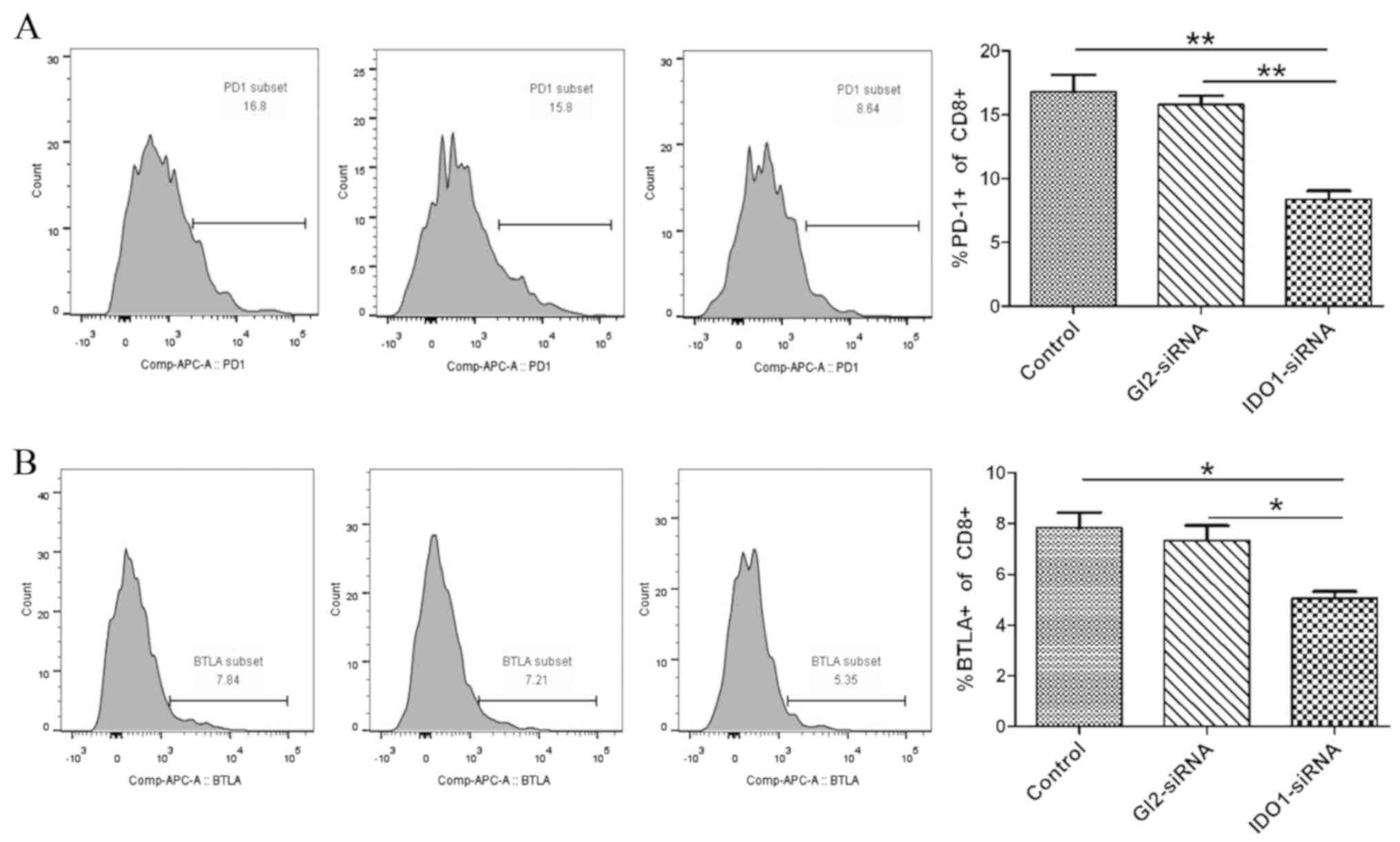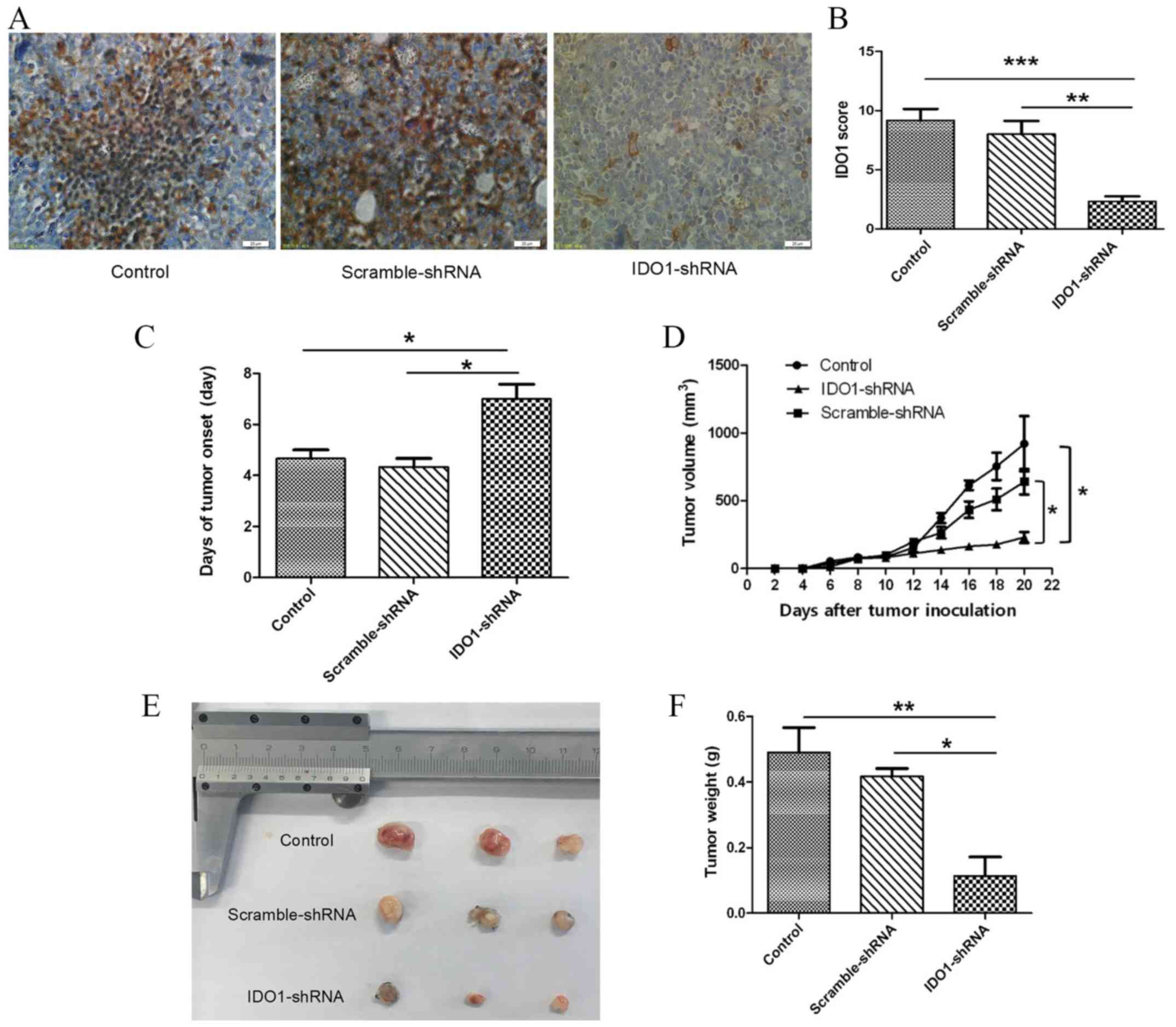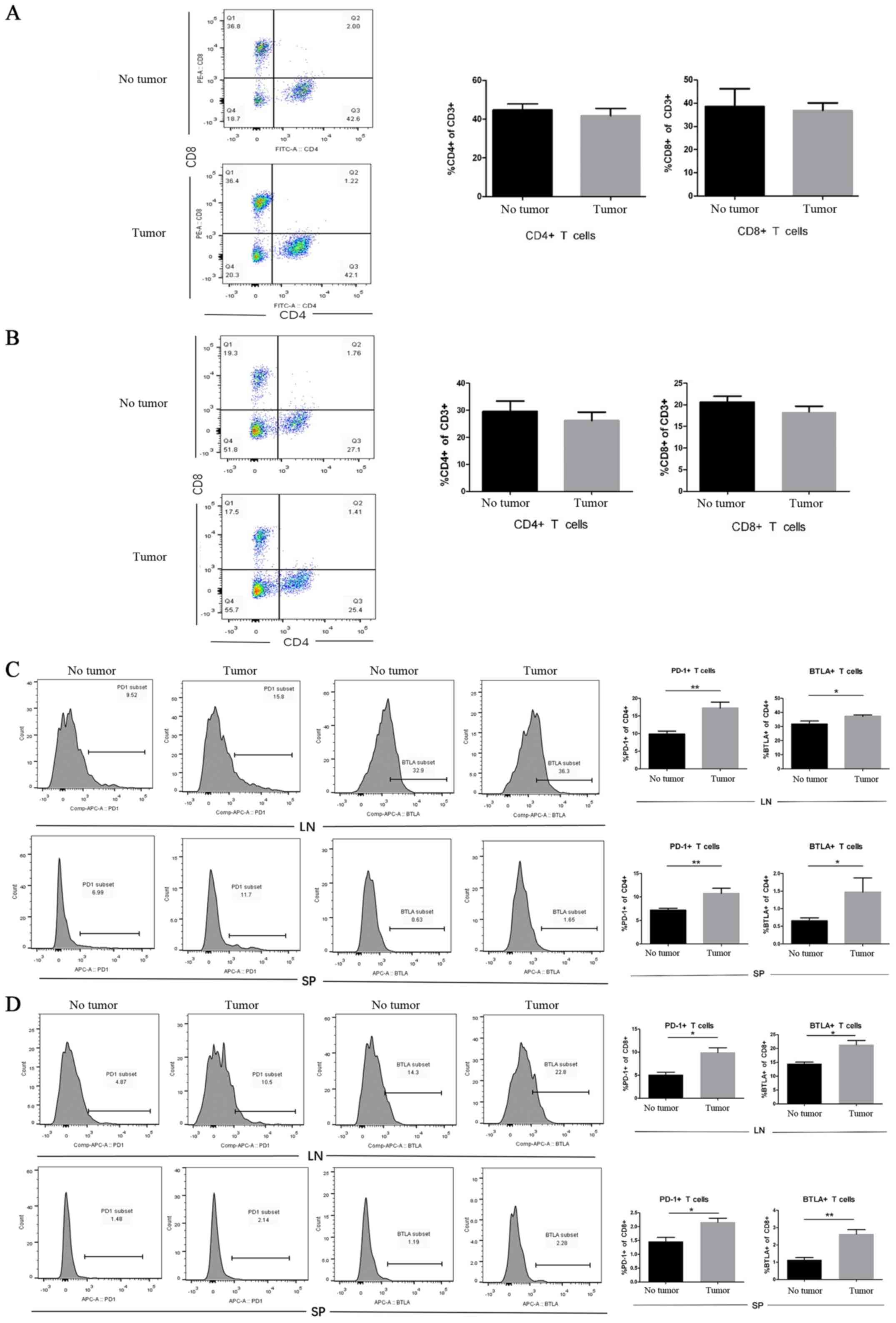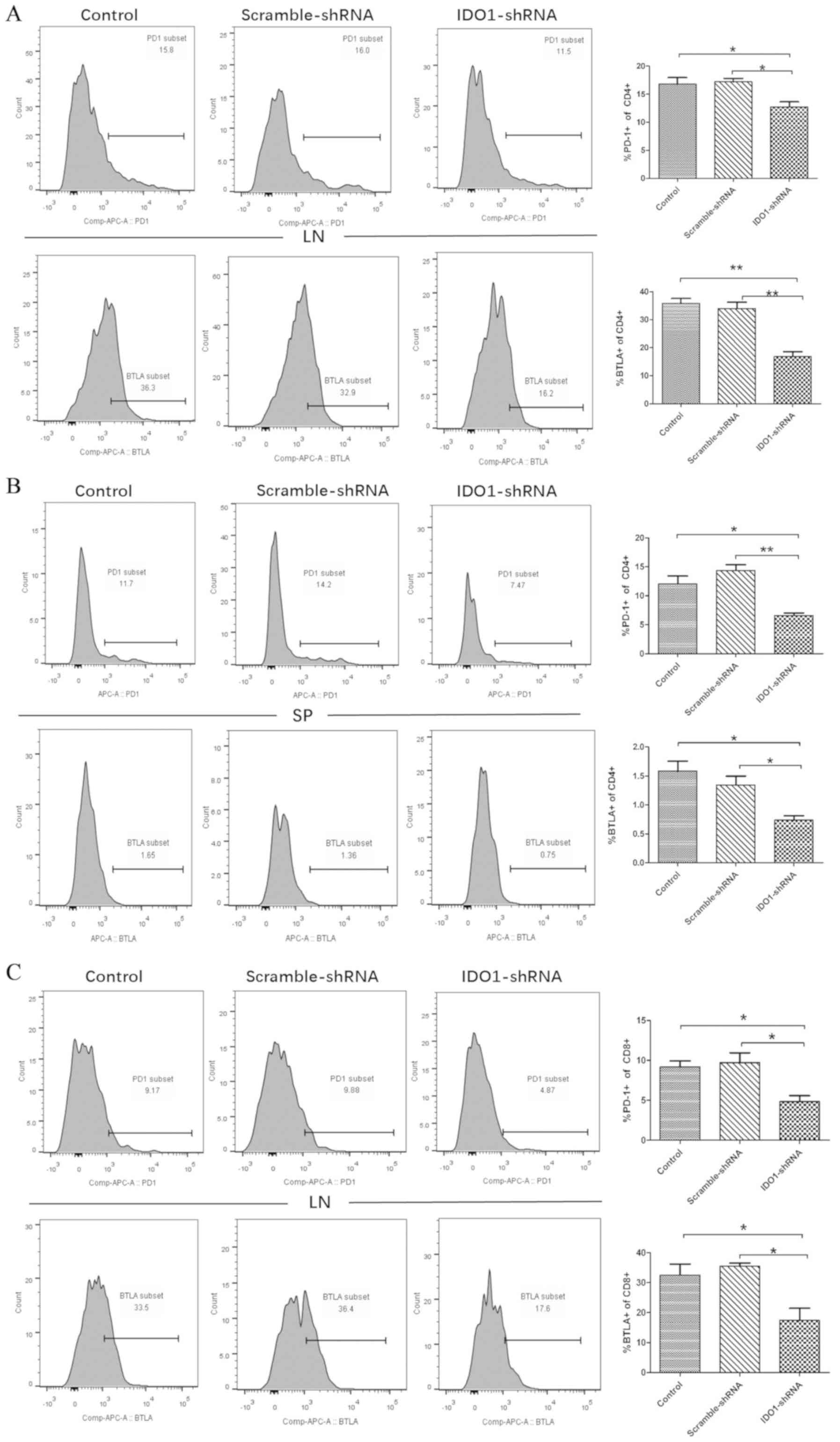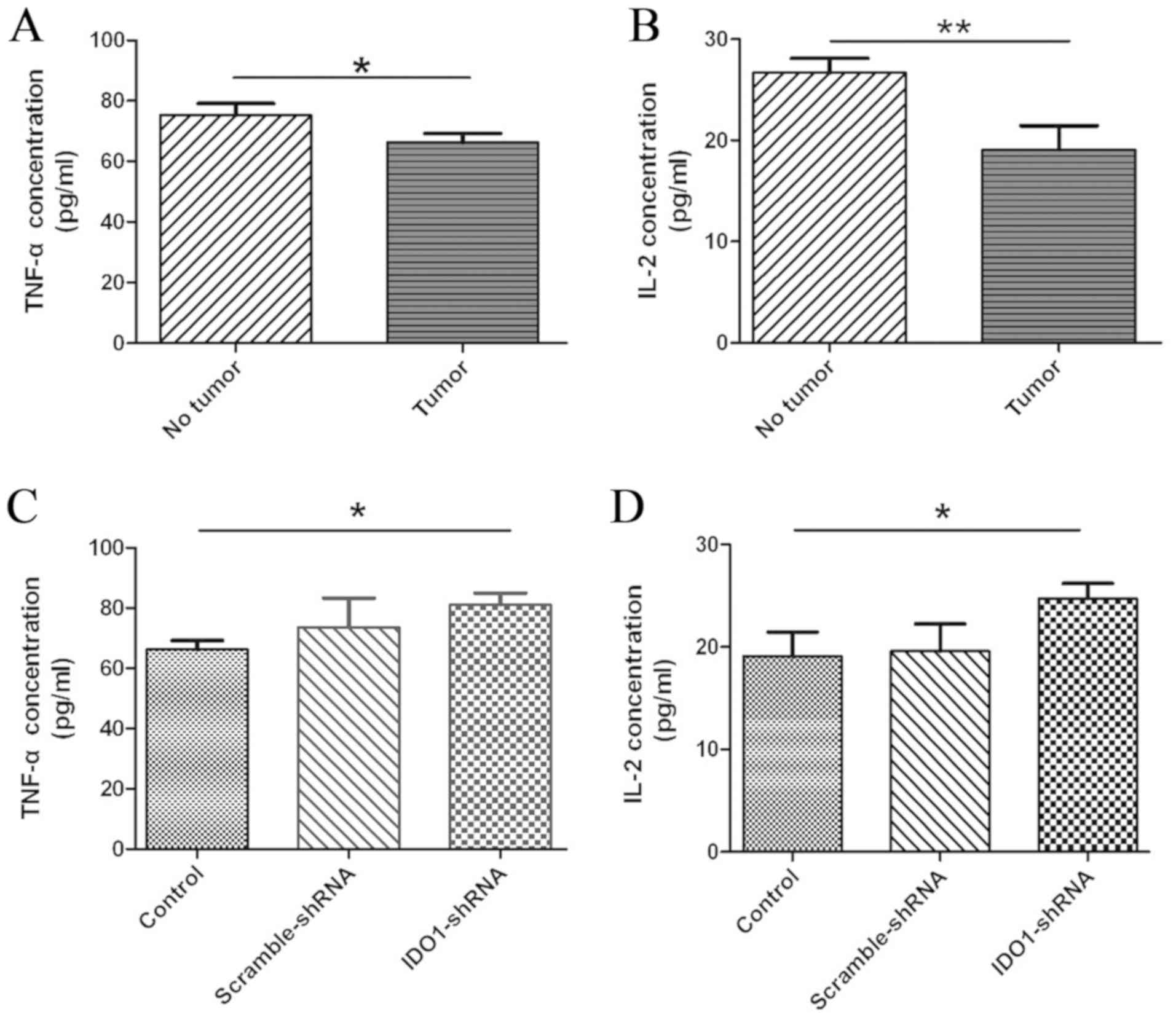|
1
|
Siegel RL, Miller KD and Jemal A: Cancer
statistics, 2018. CA Cancer J Clin. 68:7–30. 2018. View Article : Google Scholar : PubMed/NCBI
|
|
2
|
Speeckaert R, Vermaelen K, van Geel N,
Autier P, Lambert J, Haspeslagh M, van Gele M, Thielemans K, Neyns
B, Roche N, et al: Indoleamine 2,3-dioxygenase, a new prognostic
marker in sentinel lymph nodes of melanoma patients. Eur J Cancer.
48:2004–2011. 2012. View Article : Google Scholar : PubMed/NCBI
|
|
3
|
Platten M, von Knebel Doeberitz N, Oezen
I, Wick W and Ochs K: Cancer immunotherapy by targeting IDO1/TDO
and their downstream effectors. Front Immunol. 5:6732014.PubMed/NCBI
|
|
4
|
Munn DH and Mellor AL: Indoleamine 2,3
dioxygenase and metabolic control of immune responses. Trends
Immunol. 34:137–143. 2013. View Article : Google Scholar : PubMed/NCBI
|
|
5
|
Munn DH and Mellor AL: IDO in the tumor
microenvironment: Inflammation, counter-regulation, and tolerance.
Trends Immunol. 37:193–207. 2016. View Article : Google Scholar : PubMed/NCBI
|
|
6
|
Smith C, Chang MY, Parker KH, Beury DW,
DuHadaway JB, Flick HE, Boulden J, Sutanto-Ward E, Soler AP,
Laury-Kleintop LD, et al: IDO is a nodal pathogenic driver of lung
cancer and metastasis development. Cancer Discov. 2:722–735. 2012.
View Article : Google Scholar : PubMed/NCBI
|
|
7
|
Que Z, Zou F, Zhang A, Zheng Y, Bi L,
Zhong J, Tian J and Liu J: Ganoderic acid Me induces the apoptosis
of competent T cells and increases the proportion of Treg cells
through enhancing the expression and activation of indoleamine
2,3-dioxygenase in mouse lewis lung cancer cells. Int
Immunopharmacol. 23:192–204. 2014. View Article : Google Scholar : PubMed/NCBI
|
|
8
|
Zajac AJ, Blattman JN, Murali-Krishna K,
Sourdive DJ, Suresh M, Altman JD and Ahmed R: Viral immune evasion
due to persistence of activated T cells without effector function.
J Exp Med. 188:2205–2213. 1998. View Article : Google Scholar : PubMed/NCBI
|
|
9
|
Pauken KE and Wherry EJ: Overcoming T cell
exhaustion in infection and cancer. Trends Immunol. 36:265–276.
2015. View Article : Google Scholar : PubMed/NCBI
|
|
10
|
Sakuishi K, Apetoh L, Sullivan JM, Blazar
BR, Kuchroo VK and Anderson AC: Targeting Tim-3 and PD-1 pathways
to reverse T cell exhaustion and restore anti-tumor immunity. J Exp
Med. 207:2187–2194. 2010. View Article : Google Scholar : PubMed/NCBI
|
|
11
|
Fourcade J, Sun Z, Pagliano O, Guillaume
P, Luescher IF, Sander C, Kirkwood JM, Olive D, Kuchroo V and
Zarour HM: CD8(+) T cells specific for tumor antigens can be
rendered dysfunctional by the tumor microenvironment through
upregulation of the inhibitory receptors BTLA and PD-1. Cancer Res.
72:887–896. 2012. View Article : Google Scholar : PubMed/NCBI
|
|
12
|
Matsuzaki J, Gnjatic S, Mhawech-Fauceglia
P, Beck A, Miller A, Tsuji T, Eppolito C, Qian F, Lele S, Shrikant
P, et al: Tumor-infiltrating NY-ESO-1-specific CD8+ T cells are
negatively regulated by LAG-3 and PD-1 in human ovarian cancer.
Proc Natl Acad Sci USA. 107:7875–7880. 2010. View Article : Google Scholar : PubMed/NCBI
|
|
13
|
Wherry EJ: T cell exhaustion. Nat Immunol.
12:492–499. 2011. View
Article : Google Scholar : PubMed/NCBI
|
|
14
|
Yi JS, Cox MA and Zajac AJ: T-cell
exhaustion: Characteristics, causes and conversion. Immunology.
129:474–481. 2010. View Article : Google Scholar : PubMed/NCBI
|
|
15
|
Balkhi MY, Ma Q, Ahmad S and Junghans RP:
T cell exhaustion and Interleukin 2 downregulation. Cytokine.
71:339–347. 2015. View Article : Google Scholar : PubMed/NCBI
|
|
16
|
Li S, Zhang S, Liu J, Yang C, Zhang L and
Cheng Y: The effect of PD-L1/PD-1 immunotherapy in the treatment of
squamous non-small-cell lung cancer: A meta-analysis of randomized
controlled clinical trials. J Thorac Dis. 11:4453–4463. 2019.
View Article : Google Scholar : PubMed/NCBI
|
|
17
|
Yoon JS, Song JH, Yoon JH, Lee HY, Kim SW,
Chang Y, Lee YB, Cho EJ, Yu SJ, Sinn DH, et al: Adjuvant
cytokine-induced killer immunotherapy for hepatocellular carcinoma:
A propensity score-matched analysis of real-world data. BMC Cancer.
19:5232019. View Article : Google Scholar : PubMed/NCBI
|
|
18
|
Bu X, Yao Y and Li X: Immune checkpoint
blockade in breast cancer therapy. Adv Exp Med Biol. 1026:383–402.
2017. View Article : Google Scholar : PubMed/NCBI
|
|
19
|
Mirzaei R, Sarkar S and Yong VW: T cell
exhaustion in glioblastoma: Intricacies of immune checkpoints.
Trends Immunol. 38:104–115. 2017. View Article : Google Scholar : PubMed/NCBI
|
|
20
|
Robert C, Ribas A, Wolchok JD, Hodi FS,
Hamid O, Kefford R, Weber JS, Joshua AM, Hwu WJ, Gangadhar TC, et
al: Anti-programmed-death-receptor-1 treatment with pembrolizumab
in ipilimumab-refractory advanced melanoma: A randomised
dose-comparison cohort of a phase 1 trial. Lancet. 384:1109–1117.
2014. View Article : Google Scholar : PubMed/NCBI
|
|
21
|
O'Connor JM, Seidl-Rathkopf K, Torres AZ,
You P, Carson KR, Ross JS and Gross CP: Disparities in the use of
programmed death 1 immune checkpoint inhibitors. Oncologist.
23:1388–1390. 2018. View Article : Google Scholar : PubMed/NCBI
|
|
22
|
Teo MY and Rosenberg JE: Nivolumab for the
treatment of urothelial cancers. Expert Rev Anticancer Ther.
18:215–221. 2018. View Article : Google Scholar : PubMed/NCBI
|
|
23
|
Harris-Bookman S, Mathios D, Martin AM,
Xia Y, Kim E, Xu H, Belcaid Z, Polanczyk M, Barberi T, Theodros D,
et al: Expression of LAG-3 and efficacy of combination treatment
with anti-LAG-3 and anti-PD-1 monoclonal antibodies in
glioblastoma. Int J Cancer. 143:3201–3208. 2018. View Article : Google Scholar : PubMed/NCBI
|
|
24
|
Qin S, Xu L, Yi M, Yu S, Wu K and Luo S:
Novel immune checkpoint targets: Moving beyond PD-1 and CTLA-4. Mol
Cancer. 18:1552019. View Article : Google Scholar : PubMed/NCBI
|
|
25
|
Friberg M, Jennings R, Alsarraj M,
Dessureault S, Cantor A, Extermann M, Mellor AL, Munn DH and
Antonia SJ: Indoleamine 2,3-dioxygenase contributes to tumor cell
evasion of T cell-mediated rejection. Int J Cancer. 101:151–155.
2002. View Article : Google Scholar : PubMed/NCBI
|
|
26
|
Schafer CC, Wang Y, Hough KP, Sawant A,
Grant SC, Thannickal VJ, Zmijewski J, Ponnazhagan S and Deshane JS:
Indoleamine 2,3-dioxygenase regulates anti-tumor immunity in lung
cancer by metabolic reprogramming of immune cells in the tumor
microenvironment. Oncotarget. 7:75407–75424. 2016. View Article : Google Scholar : PubMed/NCBI
|
|
27
|
Livak KJ and Schmittgen TD: Analysis of
relative gene expression data using real-time quantitative PCR and
the 2(-Delta Delta C(T)) method. Methods. 25:402–408. 2001.
View Article : Google Scholar : PubMed/NCBI
|
|
28
|
Pan J, Yuan K, Peng S, Huang Y, Zhang Y,
Hu Y, Feng Y, Shi Y, Liu Y, Wang H, et al: Gene silencing of
indoleamin 2,3-dioxygenase hinders tumor growth through
angiogenesis inhibition. Int J Oncol. 50:2136–2144. 2017.
View Article : Google Scholar : PubMed/NCBI
|
|
29
|
Naito S, von Eschenbach AC, Giavazzi R and
Fidler IJ: Growth and metastasis of tumor cells isolated from a
human renal cell carcinoma implanted into different organs of nude
mice. Cancer Res. 46:4109–4115. 1986.PubMed/NCBI
|
|
30
|
Escoffre JM, Novell A, Serrière S, Lecomte
T and Bouakaz A: Irinotecan delivery by microbubble-assisted
ultrasound: In vitro validation and a pilot preclinical study. Mol
Pharm. 10:2667–2675. 2013. View Article : Google Scholar : PubMed/NCBI
|
|
31
|
American Veterinary Medical Association
(AVMA), . AVMA Guidelines for the Euthanasia of Animals: 2013
Edition. AVMA; Schaumburg, IL: 2013
|
|
32
|
Powell K, Ethun K and Taylor DK: The
effect of light level, CO2 flow rate, and anesthesia on
the stress response of mice during CO2 euthanasia. Lab
Anim (NY). 45:386–395. 2016. View Article : Google Scholar : PubMed/NCBI
|
|
33
|
Li Q, Johnston N, Zheng X, Wang H, Zhang
X, Gao D and Min W: miR-28 modulates exhaustive differentiation of
T cells through silencing programmed cell death-1 and regulating
cytokine secretion. Oncotarget. 7:53735–53750. 2016.PubMed/NCBI
|
|
34
|
Thommen DS and Schumacher TN: T cell
dysfunction in cancer. Cancer Cell. 33:547–562. 2018. View Article : Google Scholar : PubMed/NCBI
|
|
35
|
Muller AJ and Prendergast GC: Indoleamine
2,3-dioxygenase in immune suppression and cancer. Curr Cancer Drug
Targets. 7:31–40. 2007. View Article : Google Scholar : PubMed/NCBI
|
|
36
|
Zhang Y, Fu J, Shi Y, Peng S, Cai Y, Zhan
X, Song N, Liu Y, Wang Z, Yu Y, et al: A new cancer immunotherapy
via simultaneous DC-mobilization and DC-targeted IDO gene silencing
using an immune-stimulatory nanosystem. Int J Cancer.
143:2039–2052. 2018. View Article : Google Scholar : PubMed/NCBI
|
|
37
|
Ladomersky E, Zhai L, Lenzen A, Lauing KL,
Qian J, Scholtens DM, Gritsina G, Sun X, Liu Y, Yu F, et al: IDO1
inhibition synergizes with radiation and PD-1 blockade to durably
increase survival against advanced glioblastoma. Clin Cancer Res.
24:2559–2573. 2018. View Article : Google Scholar : PubMed/NCBI
|
|
38
|
Jiang T, Sun Y, Yin Z, Feng S, Sun L and
Li Z: Research progress of indoleamin 2,3-dioxygenase inhibitors.
Future Med Chem. 7:185–201. 2015. View Article : Google Scholar : PubMed/NCBI
|
|
39
|
Fire A, Xu S, Montgomery MK, Kostas SA,
Driver SE and Mello CC: Potent and specific genetic interference by
double-stranded RNA in Caenorhabditis elegans. Nature. 391:806–811.
1998. View Article : Google Scholar : PubMed/NCBI
|
|
40
|
Vakili S, Ebrahimi SS, Sadeghi A,
Gorgani-Firuzjaee S, Beigy M, Pasalar P and Meshkani R:
Hydrodynamic-based delivery of PTP1B shRNA reduces plasma glucose
levels in diabetic mice. Mol Med Rep. 7:211–216. 2013. View Article : Google Scholar : PubMed/NCBI
|
|
41
|
Amezquita RA and Kaech SM: Immunology: The
chronicles of T-cell exhaustion. Nature. 543:190–191. 2017.
View Article : Google Scholar : PubMed/NCBI
|
|
42
|
Prall F and Hühns M: The PD-1 expressing
immune phenotype of T cell exhaustion is prominent in the
‘immunoreactive’ microenvironment of colorectal carcinoma.
Histopathology. 71:366–374. 2017. View Article : Google Scholar : PubMed/NCBI
|
|
43
|
Yost KE, Spantidea PI, Wells DK, Qi Y,
Wang C, Kageyama R, McNamara KL, Granja JM, Sarin KY, Brown RA, et
al: Clonal replacement of tumor-specific T cells following PD-1
blockade. Nat Med. 25:1251–1259. 2019. View Article : Google Scholar : PubMed/NCBI
|
|
44
|
Hanahan D and Weinberg RA: Hallmarks of
cancer: The next generation. Cell. 144:646–674. 2011. View Article : Google Scholar : PubMed/NCBI
|
|
45
|
Paulos CM and June CH: Putting the brakes
on BTLA in T cell-mediated cancer immunotherapy. J Clin Invest.
120:76–80. 2010. View Article : Google Scholar : PubMed/NCBI
|
|
46
|
Karakatsanis S, Bertsias G, Roussou P and
Boumpas D: Programmed death 1 and B and T lymphocyte attenuator
immunoreceptors and their association with malignant
T-lymphoproliferative disorders: Brief review. Hematol Oncol.
32:113–119. 2014. View Article : Google Scholar : PubMed/NCBI
|
|
47
|
Hamid O, Robert C, Daud A, Hodi FS, Hwu
WJ, Kefford R, Wolchok JD, Hersey P, Joseph RW, Weber JS, et al:
Safety and tumor responses with lambrolizumab (anti-PD-1) in
melanoma. N Engl J Med. 369:134–144. 2013. View Article : Google Scholar : PubMed/NCBI
|
|
48
|
Mittal R, Chen CW, Lyons JD, Margoles LM,
Liang Z, Coopersmith CM and Ford ML: Murine lung cancer induces
generalized T-cell exhaustion. J Surg Res. 195:541–549. 2015.
View Article : Google Scholar : PubMed/NCBI
|
|
49
|
Hu CY, Zhang YH, Wang T, Chen L, Gong ZH,
Wan YS, Li QJ, Li YS and Zhu B: Interleukin-2 reverses CD8(+) T
cell exhaustion in clinical malignant pleural effusion of lung
cancer. Clin Exp Immunol. 186:106–114. 2016. View Article : Google Scholar : PubMed/NCBI
|
|
50
|
Khalil DN, Suek N, Campesato LF, Budhu S,
Redmond D, Samstein RM, Krishna C, Panageas KS, Capanu M, Houghton
S, et al: In situ vaccination with defined factors overcomes T cell
exhaustion in distant tumors. J Clin Invest. 129:3435–3447. 2019.
View Article : Google Scholar : PubMed/NCBI
|















